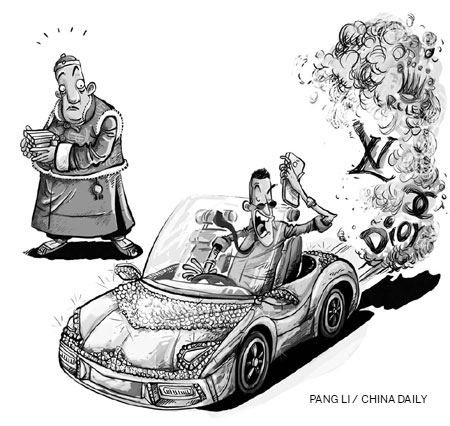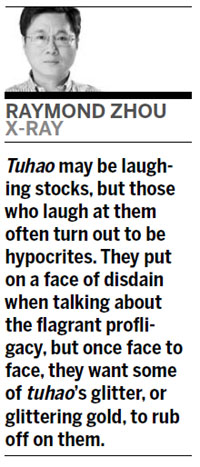Rank level for conspicuous spenders

A new term for the filthy rich sums up the uncomfortable relationship China has with its newfound wealth.
A few days ago, I stumbled upon a posting by an editor of the Chinese website of The Wall Street Journal. She was asking about the English translation of the word tuhao and whether "country baron" was good enough.
She got an avalanche of propositions, from the mundane "nouveau riche" and "upstart", to the more vivid "silly rich" and "vulgarich", and sound-alike "too hot" or "two houses". (I guess if you own two houses within Beijing's Second Ring Road, you qualify for that status.)

Someone suggested "Beverly hillbillies" and I responded by turning that to "Beijing hillbillies", all in good fun. But to add Chinese input to the English language, I'll stick here to the easy-to-pronounce tuhao.
Tuhao is not a new term. It appeared frequently in Mao Zedong's early writings as a social class that was the target of Communist condemnation. As such, it is usually translated into "local tyrants" and is ranked with "evil gentry".
The new tuhao, however, are the product of online games, referring to those players who use real money to buy virtual equipment rather than fight their way to the top on the computer. This impatient component of the gaming community is said to underwrite much of the industry because poor players contribute proportionally less in generating real revenue for the game companies.
Tuhao stand out more for the way they spend money than the fact they have money. "Tu", which used to mean "local", has now taken on the connotation of "boorish".
Dou Wentao, a celebrity TV host, recently told of a wedding where he was invited to be master of ceremonies. There was a police motorcade and, as if hiring a nationally known TV person wasn't enough, the wedding planner made it sound like Dou begged for the chance to serve him. He later divulged to Dou that he was doing all this to make his father proud and to be "envied by the locals".
Tuhao tend to cross the line of propriety when spending money. A typical tuhao has the knack of dressing in expensive clothes and still making them look cheap. In a desperate bid for respect, they fall into the trap of believing too much of a good thing is still a good thing.
A tuhao's office is often lined with photos of himself next to big-name entertainers, who were all paid big money to appear at his functions. I once suggested to one that he should simply use PhotoShop because nobody coming into his office would dare question their authenticity, and instead of rigid poses, he could have the celebrities in more informal and relaxed settings with him so people would assume they are longtime buddies.
The litany of tuhao extravagancies seems to be right out of a book of sarcasm: building one's residence or office as a facsimile of the Forbidden City, the White House or other famous edifices; posing with a billion yuan in cash in a grand gesture of philanthropy, etc.
There are many name brands that are, in China, irrevocably associated with tuhao. They function as the instant token of big money and, maybe to the chagrin of their makers and sellers, bad taste. However, when Apple released its latest iPhone models, many Chinese were shocked. The company founded by Steve Jobs is reputed for its impeccable aesthetics. Now, iPhone has added champagne gold to its color, which unmistakably reminds most Chinese of the knockoffs in bright gold or studded with diamonds, fake or otherwise. Jobs must be turning in his grave when he hears Chinese nickname the new handset "the tuhao gold".
Maybe it was all intentional. Who with something to sell would reject China's newly monied as a target customer? Tuhao are undiscerning in their purchases. They would not search for a bargain but rather pay a premium for the chance to show off. In terms of profit margin, they are the best clients one could wish for.
For more X-Ray, here
















